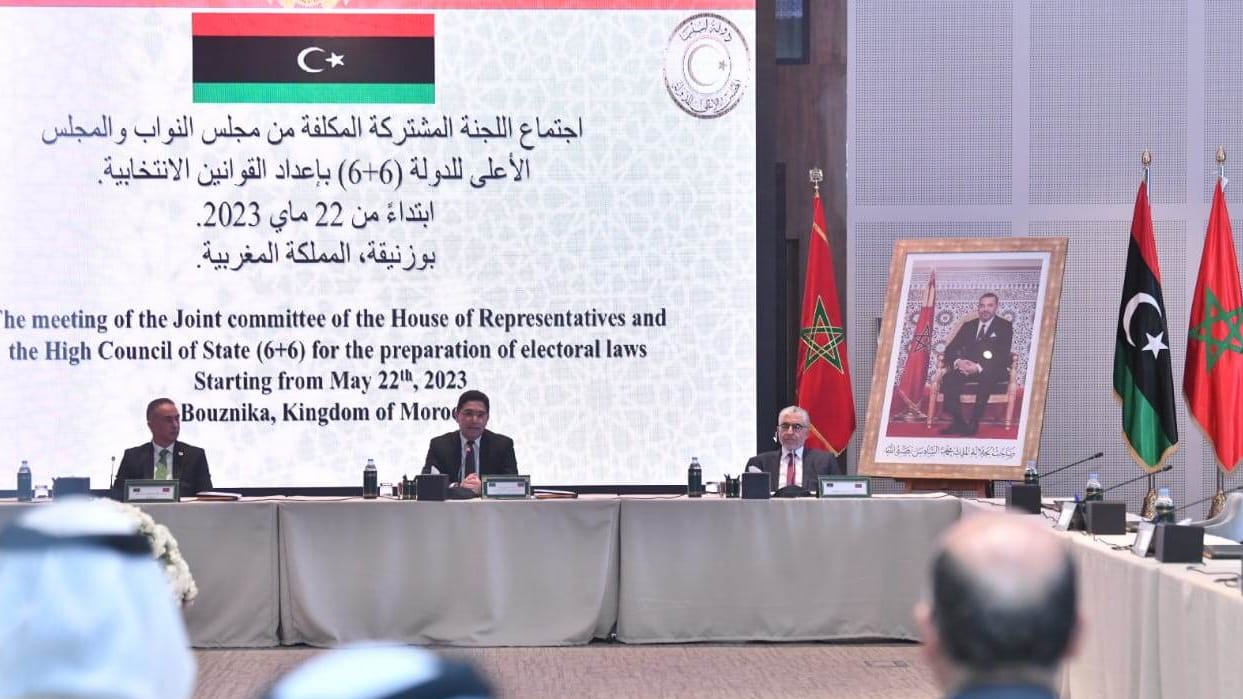The role played by Morocco in bringing the inter-Libyan dialogue to a successful conclusion within the framework of the “6+6” Joint Commission has been universally praised by regional and international organizations, the diplomatic corps of numerous nations, and numerous media outlets. They have praised the Kingdom’s active commitment to a political transition in this country through the electoral process.
Stéphane Dujarric, the spokesperson for the Secretary-General at the UN, thanked Morocco for helping the Libyan parties gathered in Bouznika to reach an agreement on the electoral regulations.
In his daily press conference, the spokesperson said, “We thank Morocco for facilitating the efforts” of the “6+6” Joint Commission members charged with creating the voting rules in Libya.
The “6+6” Libyan Joint Commission conference, which took place in Bouznika from May 22 to June 6, reached an agreement on the rules regulating the presidential and parliamentary elections planned for the end of the year, and the United Nations Support Mission in Libya (UNSMIL) congratulated Morocco for hosting it.
The Mission thanked Morocco for hosting the 6+6 Commission and conveyed its appreciation for their efforts in a statement.
The African Union (AU) welcomed Morocco in a similar manner. Chairman of the AU Commission Moussa Faki Mahamat tweeted, “I congratulate the Kingdom of Morocco on its facilitation.”
Ahmed Abou El Gheit, the secretary general of the League of Arab States, also welcomed Morocco’s efforts and expressed his hope that they would “encourage the Libyan parties, following the compromises announced, to overcome the obstacles that remain.”
The General Secretariat of the Organization of Islamic Cooperation (OIC), in a similar vein, praised the Kingdom for its contribution to the achievement of these concessions.
The General Secretariat of the Arab Maghreb Union (AMU), which praised Morocco’s efforts on behalf of the Libyan brothers as well as the strategy used by the Kingdom to give them the proper space for consultation and dialogue “far from any foreign pressure,” expressed the same degree of satisfaction.
The “6+6” Joint Commission’s compromise on the laws governing the election of the Head of State and lawmakers was welcomed by the Cooperation Council for the Arab States of the Gulf (GCC) Ministerial Council, who described it as a “positive and constructive” step in the right direction.
Several foreign missions accredited to Morocco hailed the country for their dedication as well. The British and Irish embassies expressed their appreciation for the Kingdom’s hosting of the “6+6” Joint Commission in tweets. They also praised the diplomatic efforts of Morocco for their part in settling this dispute.
The Croatian embassy, for its part, welcomed Morocco’s initiatives to support the “6+6” Joint Commission dialogue and find a solution in the hopes of resolving the political crisis in Libya, highlighting “the Kingdom’s strong and positive commitment to a peaceful political transition in Libya, through the electoral process.”
The embassies of Switzerland and the Netherlands in Rabat also praised Morocco’s “very positive” support for the orderly political transition in Libya in tweets.
Saudi Arabia praised “the efforts of the brotherly Kingdom of Morocco to make the dialogue succeed and reach a compromise, with a view to achieving a political settlement in Libya”. The Saudi Ministry of Foreign Affairs published the statement.
Iraq greatly praised Morocco’s efforts in facilitating a productive debate and reaching a settlement about the election legislation in Libya while giving political parties the chance to play a significant role in the electoral process.
The Mauritanian government applauded the “great efforts made by the Kingdom to reconcile the views of the various Libyan parties in order to reach this important agreement, which paves the way for the establishment of the necessary conditions for the completion of the Libyan electoral process in the best circumstances and in a consensual and participatory manner,” through its Ministry of Foreign Affairs.
Egypt likewise lauded the work of the “6+6” Joint Commission in a statement released by the Ministry of Foreign Affairs, praising the Kingdom for hosting the commission’s activities.
The UAE Ministry of Foreign Affairs praised “the efforts of the brotherly Kingdom of Morocco to make the dialogue successful and reach significant compromises aimed at achieving a lasting peace” in a statement that was identical.
Jordan praised the Kingdom of Morocco for its contribution to the successful negotiation and agreement between the Libyan parties over the scheduling of the presidential and parliamentary elections.
The “6+6” Joint Commission, which was charged by the Libyan House of Representatives and High Council of State with establishing the legislation regulating presidential and legislative elections in Libya, came to an agreement in the Moroccan city of Bouznika, which was warmly welcomed by the Jordanian Ministry of Foreign Affairs.
The same was true for Yemen, where the Ministry of Foreign Affairs applauded the concessions made by the “6+6” Joint Commission following two weeks of discussions in Morocco over the rules regulating the presidential and parliamentary elections planned for the end of the year.
The “6+6” Joint Commission was tasked by the Libyan House of Representatives and Council of State with drafting laws governing the presidential and parliamentary elections scheduled for the end of the current year. After roughly two weeks of meetings in Bouznika, the members of the Joint Commission came to a significant consensus, which was praised by the Kingdom of Bahrain.
Through its Ministry of Foreign Affairs, the State of Qatar thanked Morocco on Sunday for helping to facilitate communication and consultation between the Libyan parties and for its efforts in hosting the negotiations.
Additionally, a number of foreign media outlets emphasized the significance of Morocco’s contribution to the Libyan conversation. These included the Italian media, who deemed this action “crucial” in the endeavor to end the Libyan conflict, and the Argentine news outlet Alternate Press Agency, which lauded the Kingdom’s tenacious efforts in an analysis by Argentine political analyst Adalberto Agozina.
The “6+6” Joint Commission said on Tuesday night that its members had reached an agreement on the legislation regulating the presidential and parliamentary elections slated for the end of the year following two weeks of negotiations in Morocco.
The Bouznika meeting is a continuation of the series of gatherings the Kingdom has hosted, bringing together the various Libyan parties in order to deepen discussion on strategies for ending the nation’s crisis, using a strategy that creates the ideal environment for productive consultation and discussion.





